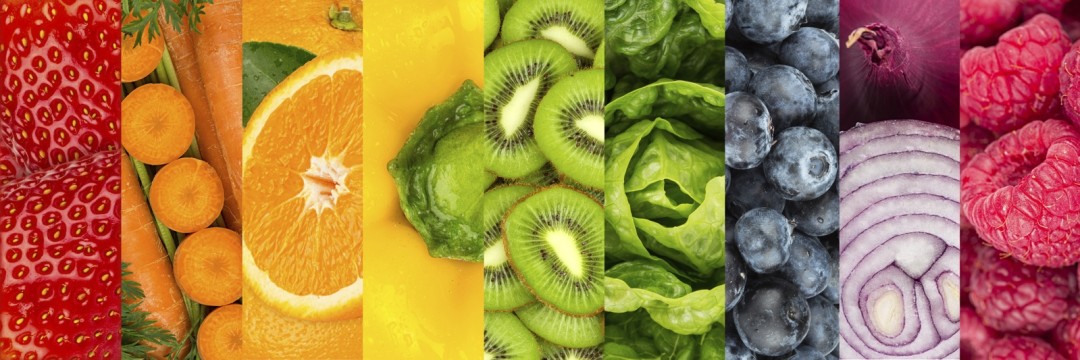Vitamins are healthy! Whether in fruits and vegetables, meat and fish or even in skincare – they are real power ingredients, we need to live. But what effects does which vitamin have? You may find the answers here:
Small amount, great effect
Vitamins are organic compounds the organism needs for vital functions. They are involved in numerous reactions of the metabolism. Vitamins indispensably help to strengthen the immune system with building cells, blood cells, bones and teeth. Every single vitamin fulfils special tasks. The body can only produce a few of these substances itself, e.g. Niacin. The body can for example produce vitamin D only with sufficient sunlight (photosynthesis). All further vitamins need to be absorbed with food.
Vitamins are divided in fat-soluble (lipophilic) and water-soluble (hydrophilic) vitamins. A, D, E and K belong to the fat-soluble vitamins. B vitamins (B1, B2, B6, niacin, pantothenic acid, folic acid, biotin and B12) as well as the important vitamin C belong to water-soluble vitamins.
Vitamins in skincare
Vitamin A (Retinol) is a real power ingredient. It is essential for the skin formation and the “gold standard” of wrinkle smoothing, helps to increase cell regeneration and skin elasticity. Vitamin A is transformed into vitamin A acid in the skin, helps to remove the uppermost skin layer and stimulates the production of new skin cells. In the event of a vitamin A deficiency, the skin can become flaky and wrinkles appear. Vitamin A is oxygen-sensitive and therefore should not be used during the day with strong sunlight. Too high concentrations of vitamin A in cosmetics can trigger allergies.
Vitamin D can have a protective effect on diverse organs and prevents diseases, because a low vitamin D level has a comprehensive effect on the immune system and the skin’s health. A vitamin D deficit plays a significant role with e.g. neurodermatitis (atopic eczema), psoriasis or vitiligo. That is why these diseases are also treated with UVB rays in dermatology. UVB rays are necessary for the synthesis of vitamin D.
Vitamin E (Tocopherol) is a natural antioxidant. An antioxidant has the purpose to eliminate free radicals and that way helps to protect the skin against skin aging and inflammations. Free radicals are molecules that can damage the cells. Alpha-tocopherol is particularly well researched. It has a very anti-oxidative effect, whereby tocotrienols that also count as vitamin E – with regard to the anti-oxidative effect – can partially be 40 times stronger.
Vitamin K is found in two natural forms (vitamin K1 and K2). Vitamin K1 is mostly absorbed through plant food, while vitamin K2 is formed through intestinal bacteria such as Escherichia coli. For the skin, vitamin K is important for stabilizing the surface capillary system and firming the skin. Thus, vitamin K can also be applied with rosacea and couperose.
Vitamin B3 (Niacinamide) is not only important for the metabolism, but also has a positive impact on the skin. In the first place, this is based on an improvement of the skin’s structure. Based on different metabolism processes it influences – among others – the barrier function and thus improves dry skin conditions. Mature skin benefits from vitamin B3 because it helps to stimulate the collagen production. Thus, skincare products with vitamin B3 also achieve anti-wrinkle effects. Moreover, niacinamide helps to reduce excessive sebum production and has an anti-inflammatory effect e.g. with acne. Furthermore, vitamin B3 also shows an effect with uneven pigmentation.
Vitamin B5 (Pantothenate) is a provitamin. In the skin, panthenol is transformed into pantothenic acid. Panthenol participates in regenerative metabolism processes of the skin. The ingredient, used for decades, helps to improve the moisture retention capacity of the skin and promotes its elasticity. An additional feature is the stimulation of epithelisation (regeneration of cells). With sensitive skin, it counteracts itching and inflammations.
Vitamin B6 (Pyridoxine) is found mainly in yeast, eggs and milk as well as seeds and nuts. A deficit of pyridoxine leads e.g. to impure skin rashes and hair growth disorders. It is hardly soluble and therefore rarely used in cosmetics.
Vitamin B7 (Biotin) is an important element the body needs for healthy skin, hair and fingernails. Furthermore, it participates in metabolism processes (fat, protein and carbohydrate metabolism). The former name “vitamin H” signalizes its meaning for the skin. Its deficit leads to growth disorders of hair, nails and skin.
Vitamin C is involved in the biosynthesis and cross-linking of collagen, but also in numerous of other metabolism activities. Main functions in cosmetics are:
- Wrinkle reduction and improvement of sun-damaged skin through the stimulation of collagen synthesis
- Protection against light-induced and oxidative skin aging through anti-oxidative effects
- Protection against hyperpigmentation and brightening effect with pigment spots through inhibiting tyrosinase-activities
- Antibacterial effect through the inhibition of bacteria that are responsible for sweat decomposition
As vitamin C is very unstable, it is usually used as a special stabilized form in cosmetics.




